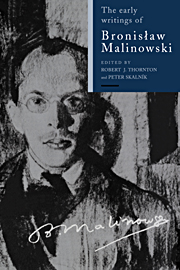Book contents
- Frontmatter
- Contents
- Preface
- Acknowledgements
- Note on the text
- Introduction: Malinowski's reading, writing, 1904–1914
- Malinowski's writings, 1904–1914
- 1 Observations on Friedrich Nietzsche's The Birth of Tragedy (1904/5)
- 2 On the principle of the economy of thought (1906)
- 3 Religion and magic: The Golden Bough (1910)
- 4 Totemism and exogamy (1911–1913)
- 5 Tribal male associations in Australia (1912)
- 6 The economic aspects of the intichiuma ceremonies (1912)
- 7 The relationship of primitive beliefs to the forms of social organization (1913)
- 8 A fundamental problem of religious sociology (1914)
- 9 Sociology of the family (1913–14)
- Notes
- References
- Index
6 - The economic aspects of the intichiuma ceremonies (1912)
Published online by Cambridge University Press: 18 December 2009
- Frontmatter
- Contents
- Preface
- Acknowledgements
- Note on the text
- Introduction: Malinowski's reading, writing, 1904–1914
- Malinowski's writings, 1904–1914
- 1 Observations on Friedrich Nietzsche's The Birth of Tragedy (1904/5)
- 2 On the principle of the economy of thought (1906)
- 3 Religion and magic: The Golden Bough (1910)
- 4 Totemism and exogamy (1911–1913)
- 5 Tribal male associations in Australia (1912)
- 6 The economic aspects of the intichiuma ceremonies (1912)
- 7 The relationship of primitive beliefs to the forms of social organization (1913)
- 8 A fundamental problem of religious sociology (1914)
- 9 Sociology of the family (1913–14)
- Notes
- References
- Index
Summary
In his new treatise, among other questions, Prof. Frazer attempts to determine the extent to which economic development has been influenced by totemism. The chief economic function of totemism lies in an ‘elementary division of labour’, and this Prof. Frazer sees in the intichiuma ceremonies performed by the Central Australians. ‘Each clan is believed to possess a magical control over its totem, and this magical power it is bound to exercise for the good of the community … The principle on which they (the ceremonies) are implicitly based is the division of labour, a sound economic principle, which properly applied cannot fail to be fruitful of good results: but misapplied by totemism to magic it is necessarily barren’. And in a short discussion the author shows that not only on this side but also in other directions, where indeed it might be expected to further economic development, totemism has had little influence on economic progress. If this view of the matter be accepted, it follows that the economic aspect of totemism possesses very little scientific interest.
It seems, however, that our evidence even as it stands might, if discussed somewhat in detail, throw considerable light on the point at issue. The intichiuma ceremonies, for example, may be shown to possess quite a special theoretical interest for ethnological economics if viewed not as primitive forms of division of labour, but from a slightly different aspect, that is, as an attempt by means of the totemic ideas to organize the community and to impose upon it a collective and regular system of labour.
- Type
- Chapter
- Information
- The Early Writings of Bronislaw Malinowski , pp. 209 - 228Publisher: Cambridge University PressPrint publication year: 1993



